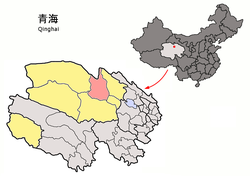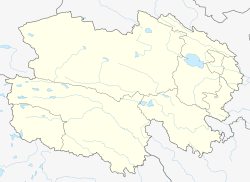Delingha
Delingha
德令哈市 · ᠳᠡᠯᠡᠬᠡᠢ ᠬᠣᠲᠠ · གཏེར་ལེན་ཁ་གྲོང་ཁྱེར། | |
|---|---|
 | |
 Location of Delingha City (red) within Haixi Prefecture (yellow) and Qinghai | |
| Coordinates (Delingha municipal government): 37°22′12″N 97°21′41″E / 37.3699°N 97.3615°E | |
| Country | China |
| Province | Qinghai |
| Autonomous prefecture | Haixi |
| Municipal seat | Hexi Subdistrict |
| Area | |
• Total | 27,700 km2 (10,700 sq mi) |
| Elevation | 2,982 m (9,783 ft) |
| Population (2020)[2] | |
• Total | 88,227 |
| • Density | 3.2/km2 (8.2/sq mi) |
| Time zone | UTC+8 (China Standard) |
| Postal code | 817000 |
| Area code | 0977 |
| Website | www |
| Delingha | |||||||
|---|---|---|---|---|---|---|---|
| Chinese name | |||||||
| Chinese | 德令哈市 | ||||||
| |||||||
| Tibetan name | |||||||
| Tibetan | གཏེར་ལིན་ཁ་གྲོང་ཁྱེར། | ||||||
| |||||||
| Mongolian name | |||||||
| Mongolian script | |||||||
| |||||||
Delingha (Chinese: 德令哈; Tibetan: གཏེར་ལིན་ཁ།), or Delhi (Mongolian: ᠳᠡᠯᠡᠬᠡᠢ ᠬᠣᠲᠠ), is the seat of the Haixi Mongol and Tibetan Autonomous Prefecture in northern Qinghai province, China. It is located approximately 200 km (120 mi) southeast of the Da Qaidam Administrative Region. It is a mainly industrial county-level city. The Bayin River divides the city into two parts: Hedong and Hexi. Because the prefecture seat is located in Hedong, it is slightly more flourishing than Hexi, which is chiefly agricultural.[1]
Established in 1988, Delingha administers seven township-level divisions covering an area of 27,700 km2 (10,700 sq mi) and has a total population of 78,184, making it the smallest of the five cities in Qinghai. The name of the city comes from Mongolian and means "golden world" (ᠠᠯᠲᠠᠨ ᠳᠡᠯᠡᠬᠡᠢ),[1] reflecting the relatively large Mongol population of the city. Da Qaidam administrative zone merged into Delingha in mid-2018.
Administrative divisions
[edit]Delingha is divided into 3 subdistricts, 3 towns, and 1 township.
| Name | Simplified Chinese | Hanyu Pinyin | Tibetan | Wylie | Mongolian (traditional script) | Mongolian (Cyrillic) | Administrative division code |
|---|---|---|---|---|---|---|---|
| Subdistricts | |||||||
| Hexi Subdistrict | 河西街道 | Héxī Jiēdào | ཆུ་ནུབ་སྲང་ལམ། | chu nub srang lam | ᠭᠣᠣᠯ ᠤᠨ ᠬᠣᠢᠨᠠᠬᠢ ᠵᠡᠭᠡᠯᠢ ᠭᠤᠳᠤᠮᠵᠢ | Голын хойнох зээл гудамж | 632802001 |
| Hedong Subdistrict | 河东街道 | Hédōng Jiēdào | ཆུ་ཤར་སྲང་ལམ། | chu shar srang lam | ᠭᠣᠣᠯ ᠤᠨ ᠡᠮᠦᠨᠡᠬᠢ ᠵᠡᠭᠡᠯᠢ ᠭᠤᠳᠤᠮᠵᠢ | Голын өмнөх зээл гудамж | 632802002 |
| Railway Station Subdistrict | 火车站街道 | Huǒchēzhàn Jiēdào | མེ་འགོར་ས་ཚུགས་སྲང་ལམ། | me 'gor sa tshugs srang lam | ᠭᠠᠯᠲᠤ ᠲᠡᠷᠭᠡᠨ ᠥᠷᠲᠡᠭᠡᠨ ᠦ ᠵᠡᠭᠡᠯᠢ ᠭᠤᠳᠤᠮᠵᠢ | Галт тэргэн өртөөний зээл гудамж | 632802003 |
| Towns | |||||||
| Gahai Town | 尕海镇 | Gǎhǎi Zhèn | ཀ་ཧྭའེ་གྲོང་རྡལ། | ka hwa'e grong rdal | ᠪᠠᠭᠠᠬᠤᠨᠠᠭᠤᠷ ᠪᠠᠯᠭᠠᠰᠤᠨ | Бааахнуур балгас | 632802100 |
| Hoit Taria Town | 怀头他拉镇 | Huáitóutālā Zhèn | ཧྭའེ་ཐིག་ཐ་ལ་གྲོང་རྡལ། | hwa'e thig tha la grong rdal | ᠬᠣᠢᠲᠤᠲᠠᠷᠢᠶᠠ ᠪᠠᠯᠭᠠᠰᠤᠨ | Хойтдаариа балгас | 632802101 |
| Hurleg Town | 柯鲁柯镇 | Kēlǔkē Zhèn | ཁི་ལུའུ་ཁི་གྲོང་རྡལ། | khi lu'u khi grong rdal | ᠬᠥᠷᠯᠥᠩ ᠪᠠᠯᠭᠠᠰᠤᠨ | Хэрлон балгас | 632802102 |
| Township | |||||||
| Suj Township | 蓄集乡 | Xùjí Xiāng | ཕྱུགས་སྐྱིལ་ཡུལ་ཚོ། | phyugs skyil yul tsho | ᠰᠦᠵᠢ ᠰᠤᠮᠤᠨ | Сүж суман | 632802200 |
Geography
[edit]Climate
[edit]Delingha has a cool semi-arid climate (Köppen BSk) just moist enough to avoid being a cool arid climate (BWk), characterised by warm summers with moderate rainfall and frigid to freezing, dry winters.
| Climate data for Delingha, elevation 2,982 m (9,783 ft), (1991–2020 normals, extremes 1971–2010) | |||||||||||||
|---|---|---|---|---|---|---|---|---|---|---|---|---|---|
| Month | Jan | Feb | Mar | Apr | May | Jun | Jul | Aug | Sep | Oct | Nov | Dec | Year |
| Record high °C (°F) | 9.6 (49.3) |
12.3 (54.1) |
18.9 (66.0) |
27.4 (81.3) |
29.3 (84.7) |
29.4 (84.9) |
34.7 (94.5) |
34.2 (93.6) |
31.7 (89.1) |
22.4 (72.3) |
14.6 (58.3) |
8.4 (47.1) |
34.7 (94.5) |
| Mean daily maximum °C (°F) | −2.4 (27.7) |
2.3 (36.1) |
7.9 (46.2) |
14.1 (57.4) |
18.2 (64.8) |
21.2 (70.2) |
23.7 (74.7) |
23.6 (74.5) |
19.1 (66.4) |
12.2 (54.0) |
4.7 (40.5) |
−0.9 (30.4) |
12.0 (53.6) |
| Daily mean °C (°F) | −9.8 (14.4) |
−5.2 (22.6) |
0.4 (32.7) |
6.8 (44.2) |
11.4 (52.5) |
14.8 (58.6) |
17.2 (63.0) |
16.8 (62.2) |
12.0 (53.6) |
4.4 (39.9) |
−3.0 (26.6) |
−8.6 (16.5) |
4.8 (40.6) |
| Mean daily minimum °C (°F) | −15.3 (4.5) |
−11.0 (12.2) |
−5.7 (21.7) |
0.1 (32.2) |
5.1 (41.2) |
9.3 (48.7) |
11.8 (53.2) |
11.4 (52.5) |
6.5 (43.7) |
−1.3 (29.7) |
−8.3 (17.1) |
−13.9 (7.0) |
−0.9 (30.3) |
| Record low °C (°F) | −30.9 (−23.6) |
−32.4 (−26.3) |
−21.3 (−6.3) |
−10.9 (12.4) |
−7.4 (18.7) |
−2.5 (27.5) |
0.5 (32.9) |
−0.9 (30.4) |
−8.9 (16.0) |
−14.2 (6.4) |
−20.3 (−4.5) |
−28.4 (−19.1) |
−32.4 (−26.3) |
| Average precipitation mm (inches) | 4.9 (0.19) |
3.8 (0.15) |
6.2 (0.24) |
6.4 (0.25) |
26.2 (1.03) |
45.9 (1.81) |
51.7 (2.04) |
39.1 (1.54) |
24.1 (0.95) |
6.1 (0.24) |
2.9 (0.11) |
1.9 (0.07) |
219.2 (8.62) |
| Average precipitation days (≥ 0.1 mm) | 3.6 | 2.2 | 2.3 | 2.5 | 6.2 | 10.5 | 11.5 | 9.3 | 6.2 | 1.9 | 1.3 | 1.9 | 59.4 |
| Average snowy days | 4.7 | 3.8 | 3.3 | 3.3 | 1.9 | 0.2 | 0 | 0 | 0 | 2.0 | 2.1 | 2.6 | 23.9 |
| Average relative humidity (%) | 41 | 34 | 28 | 27 | 35 | 44 | 48 | 46 | 45 | 36 | 35 | 38 | 38 |
| Mean monthly sunshine hours | 226.4 | 219.9 | 253.1 | 270.4 | 272.5 | 248.8 | 250.9 | 252.2 | 241.3 | 260.5 | 237.1 | 226.5 | 2,959.6 |
| Percent possible sunshine | 73 | 71 | 68 | 68 | 62 | 57 | 57 | 61 | 66 | 76 | 79 | 76 | 68 |
| Source 1: China Meteorological Administration[3][4] | |||||||||||||
| Source 2: Weather China[5] | |||||||||||||
Transportation
[edit]The Haixi Delingha Airport and Delingha railway station serve the city.
Economy and industry
[edit]Delingha will be home to a 400 million yuan "Mars village" used by the Chinese Academy of Sciences to plan future Mars explorations missions.[6]
At an altitude of 3,000 meters (9,800 ft), a 50 MW concentrated solar power plant with parabolic trough opened in 2018.[7]
References
[edit]- ^ a b c 德令哈概况 (in Simplified Chinese). Xinhua.net. Archived from the original on 1 May 2010. Retrieved 8 December 2011.
- ^ "海西州第七次全国人口普查公报(第二号)——各市县、行委常住人口情况" (in Chinese). Government of Haixi Prefecture. 2 July 2021.
- ^ 中国气象数据网 – WeatherBk Data (in Simplified Chinese). China Meteorological Administration. Retrieved 27 September 2023.
- ^ 中国气象数据网 (in Simplified Chinese). China Meteorological Administration. Retrieved 27 September 2023.
- ^ 海西 – 气象数据 -中国天气网 (in Chinese). Weather China. Retrieved 29 November 2022.
- ^ Chen, Laurie (7 September 2017). "China's Mars base plan revealed ... and covering 95,000 sq km, there's certainly plenty of space". South China Morning Post. Retrieved 9 September 2017.
- ^ Newsletter 2018, page 7

